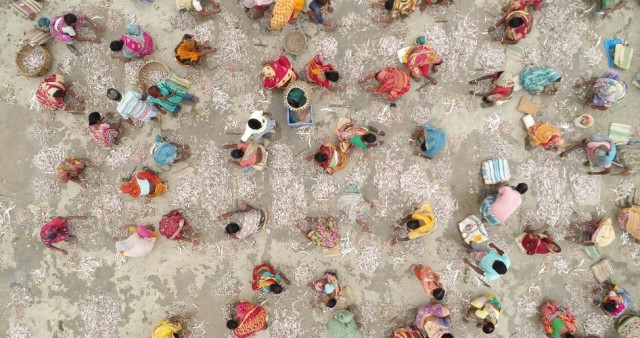Body movement workshop, film screening, and a lecture on traditional stone mill songs at Critical Zones exhibition at Zapurza organized by Goethe-Institut Max Mueller Bhavan
Critical Zones exhibition organized by the Goethe-Institut Max Mueller Bhavan Pune in collaboration with the Zapurza Museum of Arts & Culture Pune invites visitors to engage with the critical situation of the Earth in a novel and diverse way and to explore new modes of coexistence between all forms of life. As a part of this initiative, multiple programs are taking place this weekend. All the programs are free of cost for the participants. Only the museum entry fee of the Zapurza Museum of Art and Culture is payable. All programs are happening at Zapurza.
Inner Scapes, a body movement workshop by Somya Kautia and Gia. The workshop will help you explore ways of embodiment and inhabiting yourself through sensation, touch, gravity, and movement. A collective collaboration of humans and trees, language and poetry, movement and histories, this workshop offers a unique opportunity to explore these connections. All those who have curiosity for performance and movement can participate. Only 18 persons can be accommodated for this workshop.
December 10th – 4:30pm
December 11th – 9:00am
Screening of films on environment and climate-related subjects including Coral Women, In Between, and Treasures of Grasslands
December 10th – 7:00 pm to 9:00 pm.
A talk and demo by Namita Waikar from the People’s Archive of Rural India
Namita will talk about the traditional songs that rural women sing in stone grind mills. The talk will have multimedia stories along with photographs, videos, and songs in this session. For about 25 years since 1987, two social scientists from Pune and their team collected over 110,000 grindmill songs that rural women sang as they worked every day at the stone mill. This huge jatyavarchiovi collection is being published on PARI along with the stories of women who sing them under the Grindmill Songs Project (GSP). The collection speaks of the diversity and depth of this form, through which the women sing of everyday life, patriarchy, caste, poet-saints, historical events, Babasaheb Ambedkar, and more.

